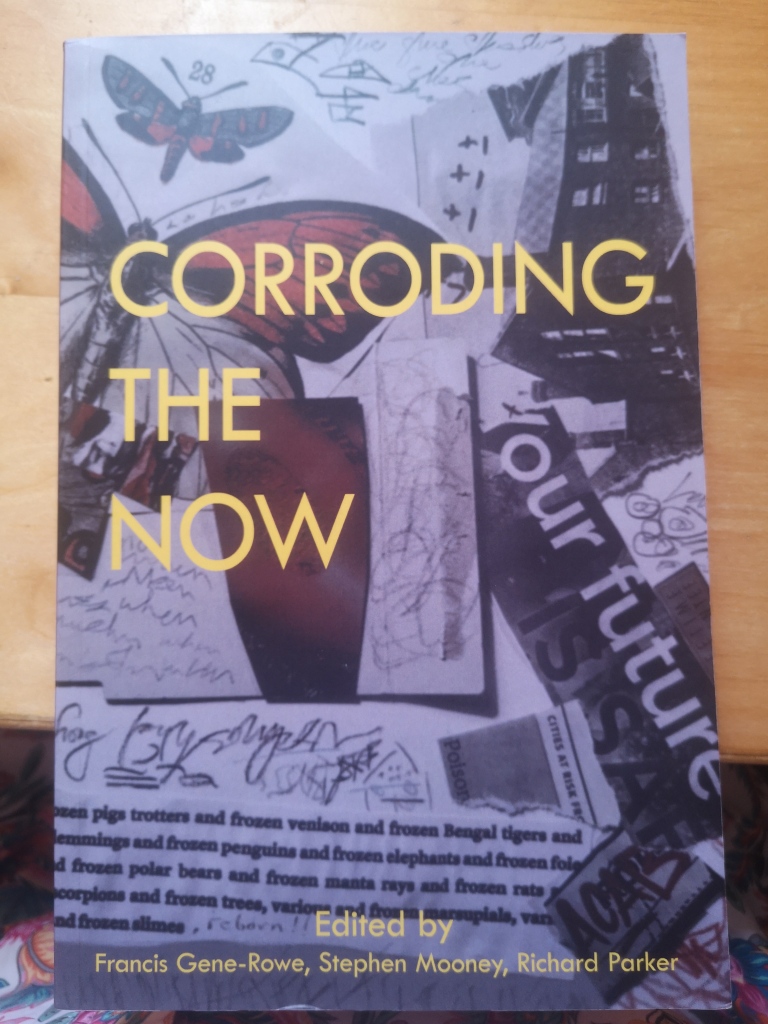I originally wrote this review for the BSFA Review but it seems to have been lost somewhere in the process.
Corroding the Now edited by Francis Gene-Rowe, Stephen Mooney and Richard Parker (Veer Books, 2023)
Reviewed by Nick Hubble

While reading this book I was reminded of the claim of I.A. Richards, one of the founding figures of English literature as an academic discipline, in his Science and Poetry (1926) that ‘[Poetry] is capable of saving us; it is a perfectly possible means of overcoming chaos’. In comparison, the poems, essays, discussion of critical theory, and other artistic forms which make up the 270 pages of Corroding the Now: Poetry + Science|SF seem more like means of embracing chaos as they speculatively map out possible ways of saving us by overcoming capitalism and the mode of seeing the world it creates: capitalist realism. In the collection’s introduction, Francis Gene-Rowe explains that ‘corrosion is about forcefully wrenching ourselves from a normality that’s always-already been a violent extractive falsehood’.
Both poetry and SF are technologies that offer the possibility of generating the necessary estrangement, or, to put it in Gene-Rowe’s terms, they demand reading protocols that might have the potential to become (re)worlding protocols. However, SF as an expression of industrial technomodernity also has a synergistic relationship with capitalism, such that it can function as ‘the sort of engine oil that the Elon Musks of the world use to lubricate their techno-messianic auras and accompany future imaginaries’. This particular dangerous combination is defused by controlled detonation in Gene-Rowe’s poems about Musk that appear near the end of the volume. On one level, therefore, another idea behind this collection is that poetry can save SF.
One of the ways in which poetry is relatively resistant to commodification is that it cannot be simply read through and consumed in the same way as straightforward realist prose. It’s not disposable in the way that magazine articles are or even fiction often can be. With poetry, you either read it fully or you don’t read it at all, and each poem requires a new focus. Consequently, Corroding the Now forces a repeated series of engagements from its reader. As we switch between poems, photographic fragments, interwoven essays, and, in one case, a scan for the Artivive app (which then plays Suzie Geeforce’s ‘Cand-e’), we are dragged out of the continuous present into a fragmentary temporal montage, which doesn’t promise postcapitalist liveable futures as much as provide a space for those reflections and questions that are otherwise subject to continual self-censorship. So, for example, Jonathan Catherall in ‘switch’ considers ‘who will do the shit jobs?’ while an extract from Verity Spott’s ‘Hopelessness’ asks ‘What’s the worst thing you are capable of?’.
The nature of many of these texts renders then irreducible to synoptic summaries. Poems such as Kat Dixon-Ward’s ‘Pond Liner, 9pm’, Liz Bahs’s ‘Nest’ and Amy Cutler’s ‘We Spiders’ challenge humanist and anthropomorphic expectations. I particular enjoyed the endnotes to Cutler’s poem, which reminded me of William Empson’s assertion that poetry functions in the manner of cryptic crosswords and notes should be provided with the answers. In the case of ‘We Spiders’, the ‘answers’ range from other poets, such as Empson’s close contemporary, Kathleen Raine, and artists, such as Louise Bourgeois, to anthropological insights concerning the Tibeto-Nurman Nuoso people of the Greater Cool Mountains of Sichuan Province, China. This is indicative of the way that poetry can throw us out into radically different contexts from the one in which we start reading.
There are also a number of essays scattered throughout the volume, some of which are poems themselves, such as the engaging extract from Jo Crot’s ‘Poetsplain’, some of which are paired with poems and all of which are connected and interwoven with poems. This messy fusion of creative-critical approaches is perhaps the best thing of all about Corroding the Now: an anarchic assault on binaries and boundaries. As Naomi Foyle notes in ‘Burying the Wet Computer: Notes Toward an Ecotopian SF Poetics’, ‘for both poetry and science fiction, the historical status quo is a binary gridlock, blocking the creative evolution of both genres, and our wider culture’. As part of her analysis, Foyle discusses Mary Midgeley’s Science and Poetry (2000) and its rejection of the mind-body division allowing her to build a strong argument, referring to a number of writers including Octavia Butler, for how an ecotopian SF could be founded on a Gaian vision. This is immediately followed in the collection by Peter Middleton’s fascinating essay on ‘Poetry, Science Fiction, and Neurodiversity’, which covers a lot of ground while making a case that we should be applying lessons learnt from how SF investigates the neurodiversity of posthuman and queer lives to studying other literary genres including poetry. Josie Taylor writes about ‘Oil Poetics and Creaturely Visions in SF’ and Fred Carter on ‘Marxist-feminist Poetics In and Against the Anthropocene’. I don’t have space to mention everything in the book but the final two pieces are Sasha Myerson and Katie Stone’s nicely worked two-hander (or is it a three-hander) exploring the science-fictional poetry of Sun Ra, and Matthew Carbery’s essay on ‘Afrofuturist Poetics in the 21st Century’, which discusses the Black Quantum Futurism collective. Reading these articles in succession has the curious side effect of blurring the distinctions between SF writers, poets and theorists. Okay, Donna Haraway has always surfed the wave of this kind of fruitful ambiguity, but I suddenly found myself wondering why Sun Ra or Hélène Cixous or Judith Butler or J.H. Prynne don’t feature more frequently in histories of SF. If we corroded the now a bit more, all sorts of new and diverse combinations of past and future might emerge. Hopefully this collection will not only inspire people to investigate further the work of the poets and writers included but also to produce their own creative-critical work in similar vein.
